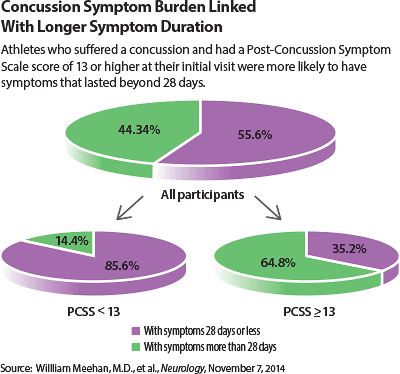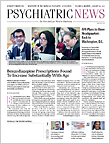A study that sought a multivariate prediction score for recovery after a concussion found that just one number was associated with symptoms’ continuing for four weeks or more.
Researchers at the Sports Concussion Clinic at Boston Children’s Hospital collected data on 531 patients (average age, 14.6) who sustained concussions in a number of sports, most commonly ice hockey, football, soccer, or basketball. The patients presented within three weeks of injury and were tested with the Post-Concussion Symptom Scale (PCSS).
After regression analysis, factors such as prior concussion, age, sex, amnesia, or a family history of concussion proved not to be significant, said William Meehan III, M.D., of Boston Children’s Hospital and director of the Micheli Center for Sports Injury Prevention in Waltham, Mass., and colleagues.
“[O]nly total symptom burden as recorded on the PCSS at the time of initial visit was independently associated with symptom duration of greater than 28 days,” they said in an online report in Neurology November 7, 2014.
“The work of Meehan and colleagues is an important step towards identifying those who are likely to have prolonged recovery following concussion,” said Jack Tsao, M.D., of the U.S. Navy Bureau of Medicine and Surgery in Falls Church, Va., and colleagues in an accompanying editorial. “Based on the findings of this study, patients and their medical providers should feel reassured that complete recoveries are likely within a month if initial symptom burden is lower.”
The researchers chose 28 days as their cutoff because experience has shown that most athletes will be symptom-free four weeks after their concussion. After that point, it would be the time to consider changes in their care.
In this cohort, 86 percent of patients with a PCSS score below 13 saw their symptoms resolve in 28 days or less. However, in 65 percent of those with a score of 13 or above, symptoms continued longer.
Computerized neurocognitive test scores performed at intake in about 24 percent of patients added no significant predictive information.
The researchers continued following their patient populations until their symptoms resolved, the study ended, or they were lost to follow-up, Meehan told Psychiatric News. “We are currently working on a longer follow-up of these patients and assessing the role that cognitive activity and physical activity play in recovery,” he said.
The study’s strong points include recruiting more than 500 patients and the researchers’ rigor in focusing on sports and not other sources of head trauma, added Antonia Baum, M.D., a private practitioner in Chevy Chase, Md., and an assistant clinical professor of psychiatry and behavioral sciences at George Washington University School of Medicine.
In the future, having baseline data recorded before the season from each athlete would help both clinicians and researchers discern any changes in function observed following the concussion, said Baum, who is also president of the International Society of Sports Psychiatry.
“It is possible that an earlier PCSS or neurocognitive test may have added further prognostic value,” said Meehan. “We are currently studying that very question in a cohort of collegiate athletes.”
In their editorial, Tsao and colleagues noted the average 12-day time before reaching the clinic.
“Data have shown that the greatest indication for injury severity and duration may come sooner,” they said. As a result, serious symptoms present early may have resolved fully or partially before the first clinic visit.
“The population we studied likely differs from the overall population of athletes who sustain concussions,” agreed Meehan, who noted the delay in the limitations section of his report.
Ultimately, the study’s results may help physicians and patients manage the aftermath of concussions, concluded Meehan and colleagues: “When planning for the care of athletes with sport-related concussions, clinicians might provide anticipatory guidance and consider earlier introduction of therapies for those athletes with a PCSS score of 13 or higher.” ■
“Early Symptom Burden Predicts Recovery After Sport-related Concussion” can be accessed
here.

